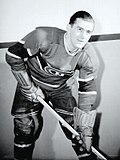Maurice Richard
Maurice "Rocket" Richard (1921-2000)[1] was a Canadian professional ice hockey player. He played for the Montreal Canadiens. He played for 18 years (1942-1960) in the National Hockey League (NHL), totaling 544 goals and 421 assistants (965 points), in 978 regular season games played. His goals scored were the most in NHL history until Gordie Howe scored his 545th in the early 1960s. Richard is considered one of the fiercest competitors and prolific goal scorers who ever played in the NHL. The "Rocket", as he became known, was followed by his brother, Henri Richard ("Pocket Rocket"). They are both ranked in the top 100 NHL hockey players of all time, "Rocket" ranked # 5, with the "Pocket Rocket #30.[2]
| Maurice Richard | |
|---|---|
| Hockey Hall of Fame, 1961 | |
| File:Maurice Richard 1945.jpg | |
| Born | August 4, 1921 Montreal, Quebec, CAN |
| Died | May 27, 2000 (aged 78) |
| Height | 5 ft 10 in (1.78 m) |
| Weight | 170 lb (77 kg; 12 st 2 lb) |
| Position | Right wing |
| Shot | Left |
| Played for | Montreal Canadiens |
| Playing career | 1942–1960 |
Playing career
Richard's first goal was against the New York Rangers on November 8, 1942. The 1944–45 NHL season was a record-setting one for Richard. He first set a new mark for points in one game when he made five goals and three assists in a 9–1 victory over the Detroit Red Wings on December 28, 1944; his eight points broke the previous record of seven held by three players; Richard broke the record on February 25, 1945, in a 5–2 victory over Toronto. Malone was on hand to present Richard with the puck used to score the 45th goal.Richard missed over 20 games of the 1951–52 season due to injury, but overcame another ailment in the playoffs.The 1952–53 season began with Richard in close pursuit of Nels Stewart's all-time NHL record of 324 goals.Richard fulfilled his promise to Canadiens' fans as he led Montreal to a Stanley Cup championship in 1955–56. The season began with the arrival of his young brother Henri to the Canadiens roster. The playoff goal was Richard's last, as on September 15, 1960, he announced his retirement as a player. Richard had reported to Montreal's training camp that fall, but Selke compelled Richard to end his playing career, fearing he was risking serious injury. In Richard's retirement speech, he said he had been contemplating leaving the game for two years, and stated that at age 39, the game had become too fast for him.
Playing style
Richard also called "the Comet" when his early playing career but then he was remark "The Rocket" because of his teammate Ray Getliffe, his style like rocket; his speed, strength and determination were all strong. His teammate Toe Blake said the moniker was fitting because "when he would take off, nothing got in his way that could stop him". Goaltender Jacques Plante said it often showed in Richard's eyes and comparing it to "the rocket's red glare" referenced in "The Star-Spangled Banner".[3] When he flying his eyes were all lit up."
Personal life
As Richard struggled both with the need to find a purpose to his post-retirement life and the fear of being forgotten, he attached his name to numerous endeavours. He acted as a consulting editor for a magazine titled Maurice Richard's Hockey Illustrated, owned the "544 / 9 Tavern" in Montreal, and was a pitchman for dozens of products, including beer, hair dye, car batteries, fishing tackle and children's toys. He continued to use his name as a promotional vehicle for over 30 years after his retirement. Richard briefly returned to hockey in 1972 as head coach for the Quebec Nordiques of the World Hockey Association. He lasted only two games, a win and a loss, before finding himself unable to handle the strain of coaching.
Richard and his wife, Lucille, lived in Montreal where they raised seven children: Huguette, Maurice Jr., Norman, André, Suzanne, Polo and Jean. They had 14 grandchildren. Lucille died of cancer in 1994, two years after the Richards celebrated their 50th wedding anniversary. Richard's companion late in his life was Sonia Raymond. It was announced in 1998 that Richard was suffering from abdominal cancer. As his health deteriorated, Richard was diagnosed with Parkinson's disease, and doctors suspected he had Alzheimer's disease. He died on May 27, 2000 of respiratory failure as a result of his cancer.
Maurice Richard Media
Richard (left) sits beside Toe Blake. *The pair, along with Elmer Lach, comprised the "Punch line" in the 1940s.
Richard in 1945. His feat of scoring 50 goals in 50 games was unmatched until Mike Bossy in 1980–81.
Richard scoring his 500th goal, 1957
Sweater that was worn by Richard during his final season
The Maurice "Rocket" Richard Trophy is presented annually to the leading goal scorer in the NHL
- Tombe de MRichard1.JPG
Tomb for Richard at Notre Dame des Neiges Cemetery in Montreal
- Monument Maurice Richard Gatineau (40010551175).jpg
The monument to Richard outside Jacques Cartier Park in Gatineau, Quebec
- Rocket Richard 500th NHL goal puck (photo by Djuradj Vujcic).jpg
The puck Richard used to score his 500th NHL goal on October 19, 1957. Richard was the first player in league history to record 500 career goals.
References
- ↑ "Henri Richard (1955-1975)". Sports Reference LLC. Archived from the original on 16 December 2014. Retrieved 5 Feb 2015.
- ↑ "Henri Richard/web". Bluesponge. Archived from the original on 26 March 2015. Retrieved 5 Feb 2015.
- ↑ Cameron, Steve, ed. (2013), Hockey Hall of Fame Book of Players, Richmond Hill, Ontario: Firefly Books, p. 156, ISBN 978-1-77085-224-2
